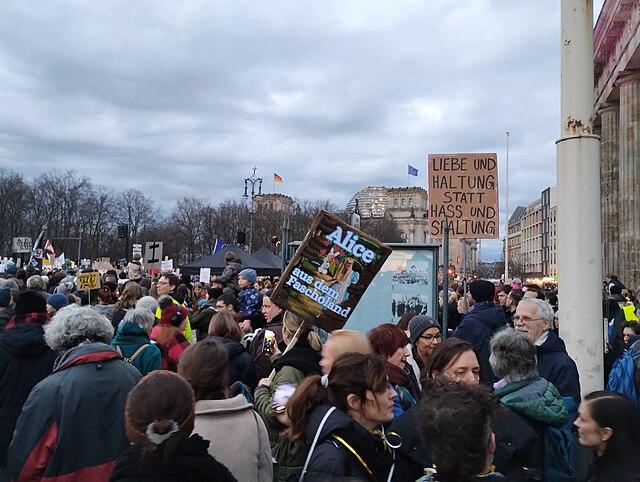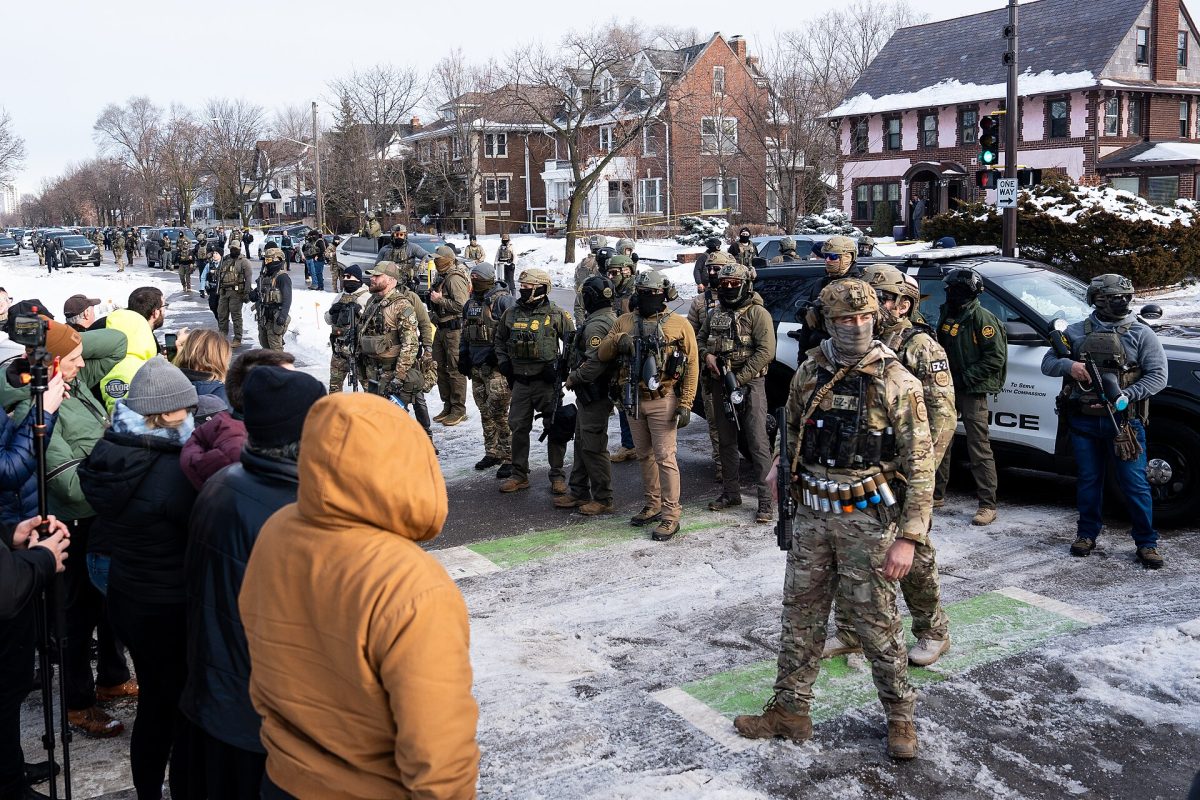You know the meme: “everything I don’t like is woke”? Well, there’s a left wing version of this: “everything I don’t like is fascist”. So, Donald Trump is a fascist, Vladimir Putin is a fascist. . . my mum is a fascist if she asks me to clean up after me. The inflationary usage of the word fascism makes it a synonym for anything which is vaguely authoritarian. This makes it more difficult to identify the real fascists and what we specifically need to do to stop them.
In this article, I will look at some parties in Europe, and the USA, and ask how close they are to fascism. But before I do that, let me be clear what I mean by fascism. There are different definitions, but I find this quote, by Leon Trotsky, to provide a useful overview.
Traditionally, the core supporters of fascism are people who do not have trade unions or big capital to defend them. “Fascism unites and arms the scattered masses. Out of human dust, it organizes combat detachments. It thus gives the petty bourgeoisie the illusion of being an independent force.“ For this reason, fascism plays a particular emphasis on street mobilisations.
This raises a number of issues, I will answer some in this article and I hope to write more soon. For now it is important to say that fascism cannot be simply reduced to racism and authoritarianism. Its end goal is to overthrow the State, and to exterminate, not just people who do not conform to the fascists’ vision, but all opposition.
The US Republicans – A Party which tolerates Fascists in its ranks
While I do not agree with the claim that Donald Trump is a Fascist (yet), he has presided over a change in the Republican Party. In 2017, shortly after Trump was first sworn in as president, there was a “Unite the Right” demonstration in Charlottesville. This demonstration was dominated by Nazis, and demonstrators were filmed happily chanting “Jews will not replace us”.
In ‘How Charlottesville transformed the Republican Party’, Rafi Schwarz argues: “The Unite the Right attendees, a motley assortment of neo-Nazis, neo-Confederates, and out-and-out white nationalists, had thrived in scattered pockets around the country for decades. That they existed was itself nothing new. What was new, however, was the GOP’s [Republican party’s] recognition of the nascent era of Trumpian conservatism as an opportunity to both cement and capitalize on those shared interests.”
Trump called the demonstrators “very fine people”. According to Schwarz this had “no lasting political consequences.” Schwarz’s conclusion is that after Charlottesville, “the party became a vehicle for enterprising politicians who tacitly condoned the vitriol to advance their own political careers, actively casting its net into the murky waters that they’d once kept at arms distance.”
Under Trump, the Republicans offer a home for Nazis, but the party remains fundamentally a conservative electoral party. Their aim is taking power through elections, not by overthrowing the state. For this reason, it would be a mistake to call the Republicans a fascist party.
Reform UK – A potential Fascist Party
Reform UK is a new formation, whose fate is not yet sealed. Like its predecessors UKIP and the Brexit party, it was originally founded to contest elections, to demand and defend Britain’s exit from the EU, and to profit from the collapse of the Conservative Party.
4 million people voted for Reform UK in last year’s UK election. Growing disappointment with Kier Starmer’s Labour government means that they have the potential to win many more. Particularly worrying was the role of Reform UK in last year’s racist riots organised by Nazis against refugee homes. Party leader Nigel Farage released a video, in which he said the riots were “nothing to what could happen over the course of the next few weeks.” Of Reform UK voters 21% supported the riots.
At the moment, Reform UK remains primarily a racist electoral party attempting to replace the Conservatives in parliament. But they are already using “anti-capitalist” right wing demagogy and are building relations with fascists in France and Germany. If Nazis are successful at taking over the streets, Reform UK could become quickly an organisation which colludes with, and provides a centre for them.
The electoral victory and the riots show the 2 directions in which Reform UK could develop. Do they want to build a parliamentary opposition then become a government party? Will they concentrate on street actions? Or will they – like some other European fascist parties – look for a third way which tries to combine both strategies?
Rassemblement National – Nazis through and through
Rassemblement National (RN) in France under Marine Le Pen has cultivated an image of being “only” right wing extremists who no longer have any connections with actual Nazis. In his recent obituary of Fascist leader Jean Marie Le Pen, John Mullen describes this as: “a determined and generally successful campaign of ‘image detoxification’ … Nazi links were to be more comprehensively hidden, even organizing street demonstrations was to be avoided.”
Le Pen “expelled her father from the organization (since he would not give up his sarcastic-toned antisemitism) as well as some other open nazis. She instructed MPs to concentrate on respectability, and was eventually to be seen at pro-Israel ‘marches against antisemitism’ in 2023. Marine Le Pen’s femininity was also used to reassure voters that the old fascist values, generally associated with virility and masculinity, were no longer at the centre of the RN’s politics.”
But the politics of the Le Pen family and their party remain the same. At the moment, they are concentrating on winning elections. But this is part of a longer term strategy of building a mass party with a Nazi nucleus.
This is not a new plan. In John’s obituary, he remembers the 1970s strategy of Jean-Marie’s Front National: “Its Nazi core was to be hidden, and election campaigns, instead of street fighting, were to be the priority. Expressing antisemitism was shelved, while anti-Arab racism and islamophobia became almost the sole focus. Finally, traditional racism based on fake theories of biological hierarchy was left behind, the new discourse being based on ‘incompatible’ cultures and the ‘war between civilizations’. ”
As I wrote previously: “A recent report found that at least fifteen deputies from Le Pen’s National Rally party have been part of a racist Facebook group for the last 7 years. Posts in the group include: ‘Go back to your coconut tree, bamboula’ or ‘You call that a human being? Even my dog behaves better. They are really harmful, these Blacks.’ RN also maintains close but discrete links with the identitarian organisation Génération Identitaire.”
Where does the AfD fit into all this?
The AfD is no longer what it was. When it was founded in 2013, it was led by neo-liberal Eurosceptics who were not unlike Nigel Farage. These people, like Bernd Lucke (lead candidate in the 2014 EU elections), Frauke Petry or Jörg Meuthen (both national spokespeople) have either left the party or been expelled. The party is now run by hardcore Nazis.
But fascism is not a great vote winner, especially in Germany. AfD leader Alice Weidel recognises this, as a recent article in the British Guardian by Thomas Vorrever notes: “(She) has recently been attempting to rebrand the party’s image in a Marine Le Pen-like fashion.” Like her French compatriot and fellow-thinker, Weidel expresses horror at the charge of Nazism. She points out that she is a lesbian with a partner from Sri Lanka. In a recent interview with Elon Musk, she said that Hitler was “a communist”, while she is a conservative.
This strategy depends more on image than content. Katja Hoyer reports from the AfD’s recent conference that “she demanded ‘large-scale repatriations’ of foreigners, the demolition of Germany’s ‘windmills of shame’, and an end to ‘queer-woke insanity’. Despite her personal relationship, she was happy for the AfD to limit its definition of family to ‘father, mother and children’. With Weidel at the helm, the party has reached its most hardline stance to date.”
While Weidel is restoring the party’s tarnished image, the party wing “der Flügel”, led by the unapologetic fascist Björn Höcke, is gaining ground. Already over 100 hardcore Nazis work for the AfD in parliament. Höcke was the lead candidate in the recent local elections in Thüringen, where the AfD topped the polls with 34.3% of the vote.
Even in regions where the AfD is perceived as being more moderate, fascists are in the leadership. In Bavaria, party leader Stephan Protschka was a member of der Flügel and is now the lead candidate. In Baden-Württemberg, the party is led by Weidel, who has started to radicalise her rhetoric, as we saw in her recent speech in Magdeburg which was followed by random attacks on local migrants.
Under these conditions, it would be a mistake to differentiate too much between the “real Nazi” Höcke and the “more moderate” Weidel. Both Höcke and Weidel use slightly different strategies to carry out the same politics.
The New Strategy of European Fascists
In the wake of Le Pen’s success, some European fascists have followed her strategy of hiding their links with hardcore Nazis, gaining political respectability, and entering parliament. Giorgia Meloni is Italian president, one of the most powerful politicians in the Netherlands is Geert Wilders, and it looks like Austria is about to get a fascist Chancellor who has often been compared with Björn Höcke.
This means that we must fight the new fascists on two fronts. On the one hand, their street terror is real. The AfD has been uniting with street fighting Nazis – from PEGIDA to the hooligans in Magdeburg. They also used the reactionary Corona street demonstrations to disseminate conspiracy theories and Nazi propaganda.
At the same time, fascists in office also pose a dangerous threat. The AfD election manifesto calls for a return to nuclear energy, more border controls, and an almost complete ban on abortion. Policies like this have effects and victims, and must be resisted.
In areas where the AfD is most successful electorally, right wing terror has caused liberal and social democratic mayors to resign. AfD mayors are supporting increased repression. The AfD may not (yet) be building street troops like Hitler’s SA, but they are already creating a climate of fear on which they can build.
So how do we stop the fascists?
There is a popular German slogan: “fascism is not an opinion, but a crime”. While we should try and build divisions between the hardcore Nazis and their frustrated voters, we should not waste time trying to change the fascists’ minds.
Hitler said that mass mobilisations, like the Nuremberg rallies resulted in their participants being transformed “from a little worm into part of a large dragon.” Elsewhere, he said: “Only one thing could have broken our movement – if the adversary had understood its principle and from the first day had smashed with extreme brutality the nucleus of our new movement.”
Just over 10 years ago, the largest fascist demonstration in Europe took place every year in Dresden. A broad alliance, Dresden Nazifrei, organised mass blockades in 2019, 2010, and 2011 which prevented the Nazis from marching. Their demonstration no longer takes place. Similarly, blockades at the AfD conferences in Essen and Riesa occupied spaces which fascists were trying to claim.
To stop the AfD, we need two things. The first is a broad movement. Street fights between small groups of fascists and lefties will not bring us much further. The successful Dresden blockades mobilised tens of thousands, including Bundestag President Wolfgang Thierse. At the same time, we must be prepared to confront the fascists, and to stop them being able to assemble.
The Left has a proud tradition of building broad anti-fascist movements under the slogan “They Shall Not Pass” – in Cable Street, in Lewisham, and in Dresden. On each of these occasions, other demonstrations took place at the other side of town under the argument that if you ignore the fascists, maybe they’ll go away. Especially in Germany, we should be aware of the fallacy of this sort of argument.
In Dresden we did manage to convince some people to visit the “popular” demos in the city centre and then join us on the barricades which stopped the Nazis from marching. We were friendly, but hard. Wherever the Nazis try to appear, we must be there first.
At the same time, fascists thrive on despair. One main reason for their growth is the collapse of the social democrats and Greens into supporting deportations and militarisation, and the inability of the parliamentary Left to effectively oppose this. Alongside denying the fascists any space, we must build credible alternatives for a better society. It’s time to organise.




